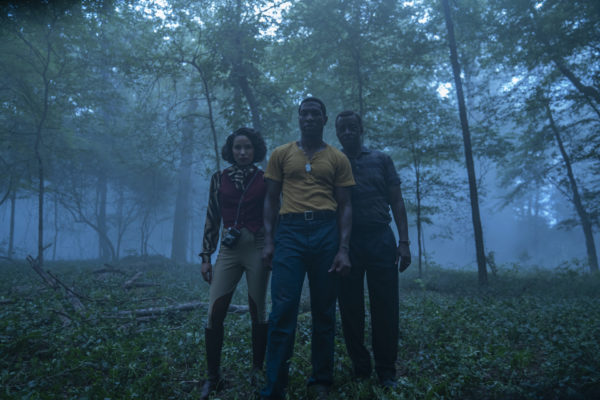
Each week Joe and Terry discuss the most recent episode of HBO’s Lovecraft Country, alternating between our respective sites.
Spoilers follow for episode 2 “Whitey’s On The Moon”…
Episode 1.02 ‘Whitey’s On The Moon”: Inexplicably recovered from their terrifying night, Leti (Jurnee Smollett) and George (Courtney B. Vance) luxuriate in their new surroundings, while Atticus (Jonathan Majors) grows suspicious of their Ardham Lodge hosts – Christina Braithwhite (Abbey Lee) and her elusive father Samuel (Tony Goldwyn) – who unveil cryptic plans for Atticus’ role in their upcoming “Sons of Adam” ceremony. Later, after Tic, Leti, and George stumble upon a clue that could lead them to Montrose (Michael Kenneth Williams), each takes an unwelcome walk down memory lane.
Missed a review? Click here for Episode 1 “Sundown”
JOE
After last week’s excellent introduction, Lovecraft Country immediately hits a stumbling block with episode two. ‘Whitey’s On The Moon’ does some things well, but it’s biggest issue is that it’s far too rushed. Clocking in at 58 mins with credits, that’s a full eight minutes shorter than the premiere and those absent minutes can be felt; at times, the action jumps around so quickly that it begins to feel frenetic.
There’s a big distinction between TV episodes that seamlessly transition from scene to scene while barely allowing the audience a moment to catch their breath. ‘Whitey’s On The Moon’ isn’t that – its scenes feel rushed, or even incomplete, which results in some herky/jerky results.
It also, unfortunately, means that the emotional impact of big moments don’t land all that well. This is a HUGE episode: Leti and Uncle George learn their memories are being erased by magic, all three family members are forced to confront their demons via hallucinations, Tic is revealed to be a descendant of the Braithwaite dynasty and the audience learns that he may not be Montrose’s son, but rather George’s.
That’s a lot, and it doesn’t even touch on the fact that the Sons of Adam ceremony is performed, Tic kills Sebastian Braithwaite (see ya, Tony Goldwyn!) and destroys the Braithwaite mansion. Oh and both Leti and George are shot and the latter possibly dies.
I would argue that of all of these events, the only moments that truly land are 1) Leti’s panic attack in the bathroom after she’s resuscitated, and 2) when she and Tic are reunited at episode’s end as they hold hands and walk back to the car in silence, tears streaming down their faces. These are both strong moments in an episode that completely upends its protagonists’ worldview, but frustratingly prioritizes magical moments and Shoggoths over smaller character-driven emotional beats.
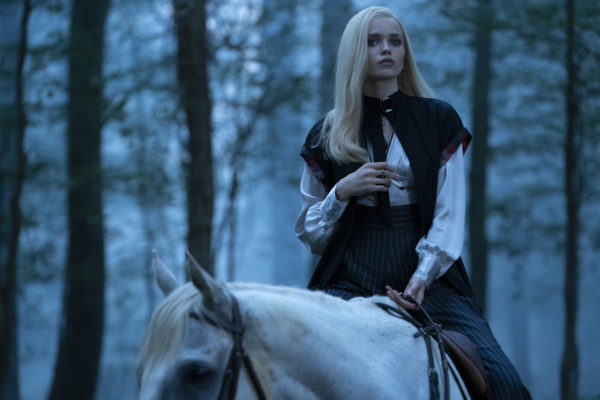
Part of my ire in these early episodes has been the desperation to cram in moments of horror. I talked about it last week for the premiere, and here it feels less shoe-horned in, but no less damaging. Two scenes, both with Christina Braithwaite, stand out as unnecessary to me: the Shoggoth attack in the woods when she uses her whistle and her delivery of a baby Shoggoth (from a cow!) in the barn. They’re both interesting and unusual and give Abbey Lee something to do, but at episode’s end, when that rushed climax is over and the dust has settled, I couldn’t help but wonder what the point of including them was?
Why does it matter that Leti and Uncle George don’t remember things? Why does it matter that Christina is intricately involved in animal husbandry? Perhaps these details will be revealed in later episodes, but if the series follows the structure of Matt Ruff’s book, then this is the last we’ll see of Ardham and the Shoggoths. What’s important is Christina and William (Jordan Patrick Wilson)’s role in assisting Tic escape certain death and I don’t think that was as clear, or meaningful, as it needed to be given what’s to come.
Terry, I think I’m lost in “adaptation brain” and wondering why screenwriters Sonya Winton and Jonathan I. Kidd made the choices that they did. What did you think about the pacing and emotional beats of episode 2? Did the Order of the Ancient Dawn ceremony work for you? And since you’re more tuned-in musically, what did you think of the use of the titular song for that key sequence?
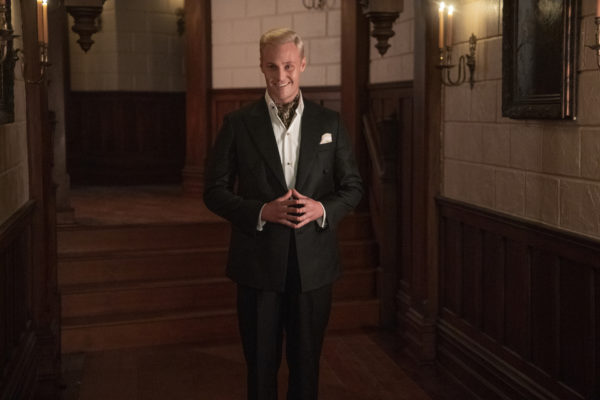
TERRY
Joe, we had talked offline a bit about the pacing because I’ve only read the first story in Ruff’s Lovecraft Country and even with the knowledge, I felt assaulted by all of the information “Whitey’s On the Moon” gave us. Every scene, as the episode hurled towards the finale, felt like it was trying to over-do everything in the previous scene in terms of revelations. At one point, I almost expected Oprah to show up shouting, “You get a revelation! You get a revelation! We all get revelations!”
Looking at the episode as a whole, I really wish they had decided to split their time in Ardham over two episodes instead of trying to cram everything into a single, herky-jerky episode. As you illustrated above, it has to do too much in the short hour runtime. From introducing character backstories to trying to establish Ardham as a real place to giving us an introduction to The Order of the Ancient Dawn, to the Sons of Adam, to the investigation of Montrose’s location…and that’s before things get even more jumbled towards the end.
It’s a lot for a single episode, particularly coming off the perfectly pitched first episode that flowed seamlessly from scene to scene and sequence to sequence.
I’m glad you brought up the music, though, because I’m incredibly excited to dive in. “Whitey’s On the Moon” follows the anachronistic trend established in “Sundown” by using music throughout the decades to illustrate and complement what’s happening on screen. It starts with “Movin’ On Up” (AKA the theme to The Jeffersons) and I loved the juxtaposition of Leti and George embracing this new, uppercrust life with Leti dancing in her immaculate dresses and George pouring over books upon books. Then there’s Tic, sitting alone in his room, staring at his hands thinking back on the night before. He goes to the window and the way it’s framed is interesting because as he’s looking out, the camera tilts and gives the mansion an ominous tone. He’s looking out of a prison window, not a deluxe apartment on the east side.
From there, we get Mourning Ritual’s cover of “Bad Moon Rising,” a song that’s been used a couple times in horror movies – namely An American Werewolf in London. It speaks to the obvious threat the Amish-like village presents to our trio as they investigate the town.
We also get Earl Grant’s “The End” and Nina Simone’s beautiful “Blackbird,” but it’s the two other choices that are most interesting. The first is Marilyn Manson’s “Killing Strangers” which complements the Braithwaites shooting Leti and Uncle George. That song, about turning anger on some “stranger” or outsider instead of foisting it on their internal “family”, is full of colonial critiques and feels oddly in tune with the Braithwaites way of seeing the world. They use others, through violent means, to further their own glory.
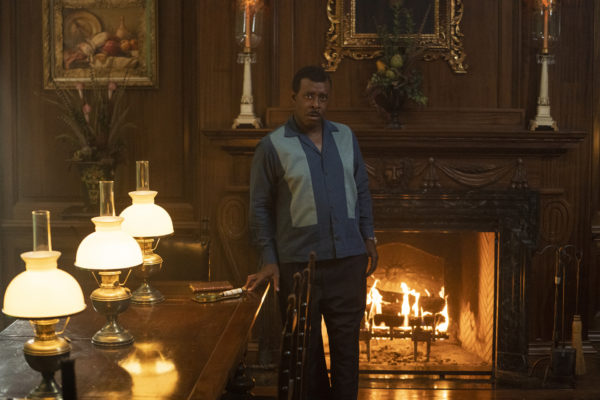
The best musical choice goes to Gil Scott-Heron’s spoken word poem “Whitey On the Moon,” which is an absolutely inspired choice to frame Braithwaites’ ritual to open the door to Eden. The poem is about the dichotomy of being able to send someone to the moon, and all the expenses attached to it, while (Black) people in America are still suffering. Gil talks about his sister who was bitten by a rat and their inability to pay the doctor’s bill…a bill they will still be paying in ten years. But we have a white person on the moon! The song explores the cost of white idealism, desire and privilege.
Going further, it’s the connection of white people’s glory, with BIPOC as the cost required (or cast aside) to get there. It’s a counterpoint to the way people covered (and still talk about) the moon landing as a tremendous step for mankind that ignores the painful and very real cost. Similarly, here we have a family, again, going for that white glory, regardless of the costs to our Black protagonists: Leti and George, shot and dying, while Tic is used as a vessel to open the mythical door (and presumably dying in the process).
So, yes, Joe to answer your question…I actually do think the ritual worked for me mostly because of the inspired music choice. By using “Whitey On the Moon,” Winton and Kidd use shorthand to explore the dichotomy between Braithwaite’s goals and the people he needs to crush to attain them.
But you also talked about the emotional beats and I want to discuss some of those beats with you further.
We get three scenes of our trio fighting manifestations of their fears and desires. Leti gets accosted by a snake-penis’d Tic while Tic, in his own hell, has a gun-and-fist fight with who I presume is the woman he called in Korea in “Sundown” (Jamie Chung). And George gets a last dance with Dora, Tic’s mother and George’s illicit paramour.
What did you think of these three scenes and what do they foretell for upcoming episodes do you think? Did you want to know more about the town of Ardham and their Shoggoth-birthing mechanism?
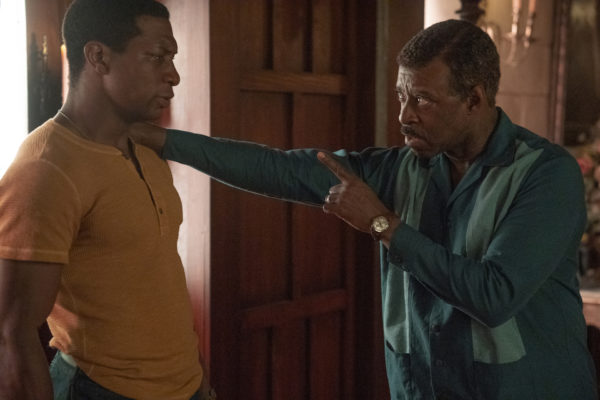
JOE
Well, I was certainly happy to see that Tic’s dream girl wasn’t a one-off, though the implication of his manifestation implies that he might have killed her when he was overseas. Leti’s vision is simultaneously the least interesting and the one that I imagine will get the most play in the series to come: her burgeoning sexual desire for Tic. The snake is obviously a clever double entendre since it connotes both the euphemism “trouser snake” and harkens back to the repeated motif about Adam and Eve that runs throughout the episode.
And then there’s George. I’ll confess that I can’t recall if this particular revelation about Tic’s mother and George is included in the book (blame speed reading in order to finish before the series began). This certainly adds an extra dimension to the introduction of the series – which framed George and Hippolyta as canoodling, very much in-love husband and wife.
It also subtly reframes the relationship between Tic and Montrose, which barely gets any play here since Montrose spends the majority of the episode hidden beneath the tower. But we know for sure that Tic and his father have a *strained* relationship, so this wrinkle will only cause more friction between them.
As for more of Ardham…yes, more time spent here would have been nice. It’s a lot of effort to establish an entire colony of (presumed) worshippers, but the requirements of the expedited plot boiled them down to a sea of faces and a caricature of a performance by Jamie Neumann as Dell. Whereas the critique of racism in the first episode, and even in the inspired music choices, worked the charm, the comparison of Black Americans to black bears was extremely on the nose and lacked any subtlety. Which is maybe fine for the series’ overall goals…but I found myself questioning the taste level of the writing here.
But Terry, I’ll kick it back to you: care to unpack the gender politics of Christina’s betrayal of her father? And you’ve talked about the music, but did you like the visual representation of the ceremony? And, since you’ve now run out of book knowledge, where do you speculate the series will go next?
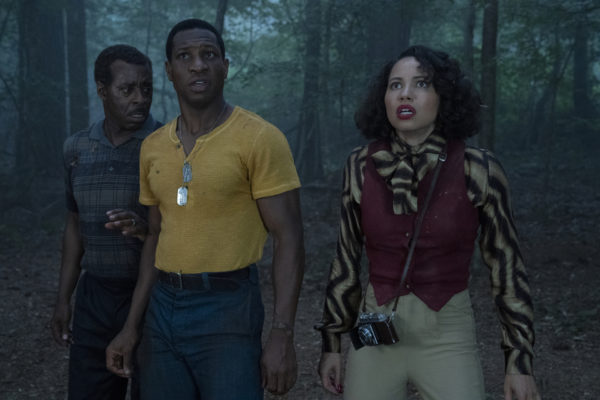
TERRY
Christina is a confounding character, Joe. She makes for an intriguing, though completely underused, villain here. Last episode, we talked about how Lovecraft Country not only explores racism in America but also sexism in the form of Leti’s character (and to a briefer extent, Hippolyta). Even our heroes discount her by not allowing her to drive, using “girl” the way straight men do, etc. Christina shows that sexism knows no color in the world of the series, as well. Towards the end of the episode while Tic is being bathed and cleansed for the ritual, Christina slips the coveted Sons of Adam ring on his finger and comments that, “I could never earn one of these no matter how hard I try and you get one just for being born a man.”
It’s interesting because on top of being notoriously racist, H.P. Lovecraft, by all accounts, was either a misogynist or a gynephobic…probably both. The internet is filled with articles about these subjects that you can peruse if interested. In some ways, Christina does fulfill the role of the treacherous woman, betraying her father. But I’m curious to see how the narrative develops her (A slight spoiler, I have seen episode 3 where she does make a brief return, so I know the series isn’t done with her). I’m curious to see whether she becomes the defacto villain or if her story is more sympathetic. Right now, she’s just one of the Nazi trio with her platinum blond father and boyfriend (in that he’s a boy and sometimes a friend, in her own words).
As for the visual representation of the ceremony…it was fine? Lots of geewhiz effects that showcases the budget Green, Peele and Abrams have managed to scrounge up. On that note, it’s cool to see the series has a budget…but I was more impressed with the aftermath, particularly the way the Sons of Adam members either turned to stone or simply crumbled away. That was particularly nifty.
For the future…well, I do know what we’re getting in episode 3 and I anticipate that the rest of the season follows an anthology approach centered around our little cadre of South Chicagoans and their struggles with monsters, both human and supernatural. I hope that with the world-building and character introductions out of the way, the rest of the season doesn’t feel so rushed. Because this is a story that deserves to be savored.
I guess we’ll see next week when we return to Gayly Dreadful for Episode 3 “Holy Ghost.”